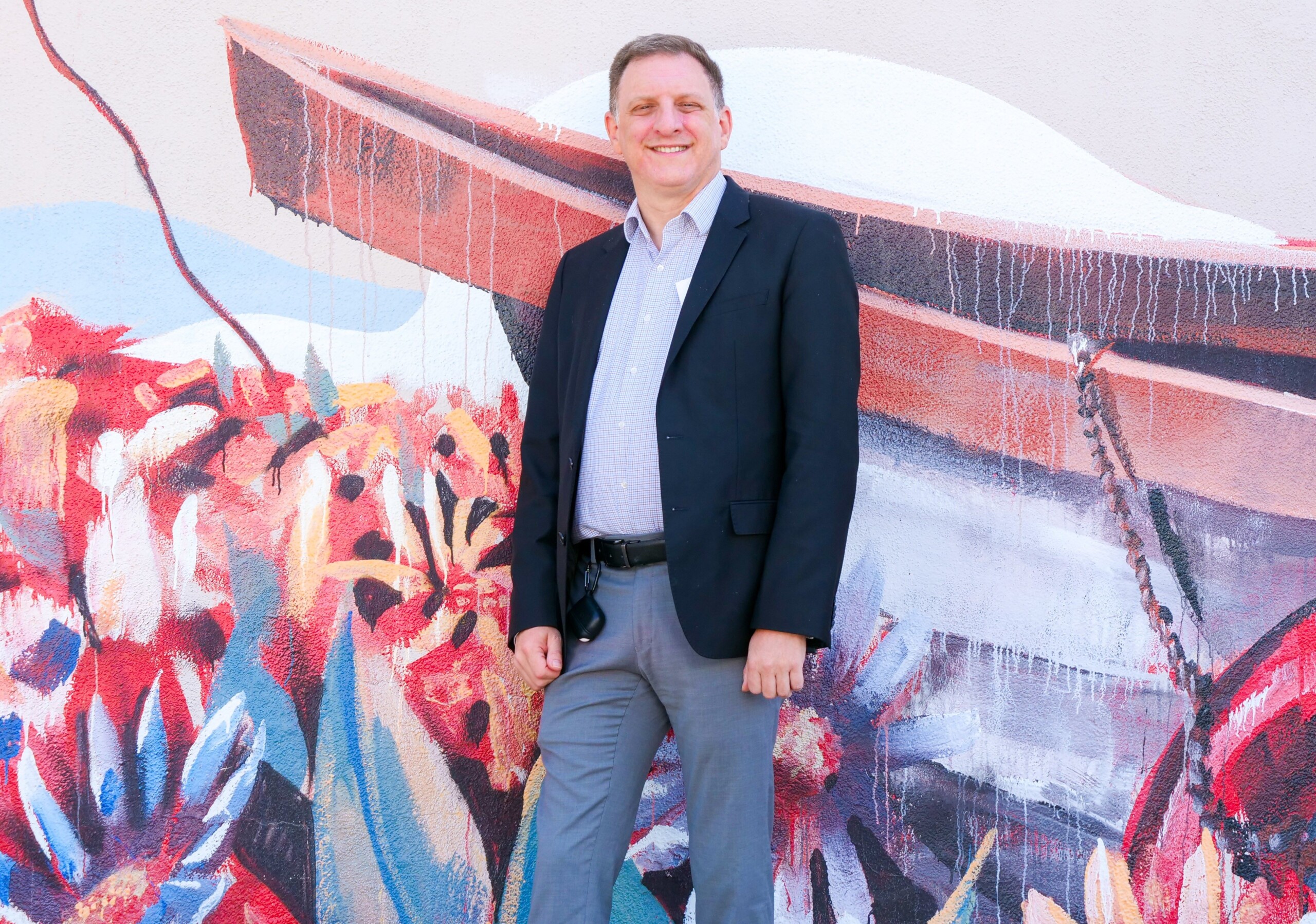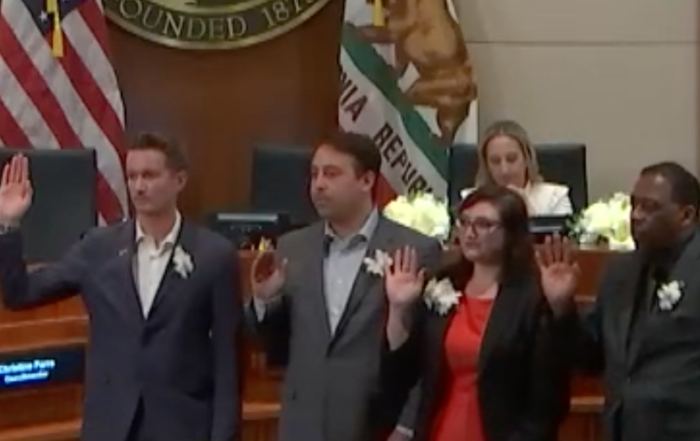There was only one man in a suit at Tanner’s Coffee.
Andrew Lachman was sitting at one of Tanner’s stools in a meeting, microphone clipped to his jacket, when a man in stark contrast to Lachman walked in to talk with him. Instead of a suit and tie, the man was wearing sunglasses, a t-shirt, and slacks, like he had just come from a hard day’s work. Lachman paused his meeting to take the time to talk with this man.
Bringing people together from all backgrounds lies at the core of Lachman’s campaign for the Culver City Unified School Board: with one of his slogans being “putting students over politics.”
This approach has garnered significant public support for Lachman, most notably from the Culver City Federation of Teachers. CCFT President Ray Long said he was impressed by Lachman and his knowledge of the district’s dynamics.
“Andrew did his homework, he understood concerns really well and spoke to them extremely well,” Long told the Westside Voice.
Running for CCUSD School Board is not the first rodeo for Lachman on the political trail, having formerly worked for the campaigns of U.S. Congressman Ted Lieu as his legislative director and having been involved in the campaigns of Los Angeles City Council Member Curren Price and former U.S. Senator Barbara Mikulski.
He also has served on several local boards including chairing the Culver City Finance Advisory Committee and serving on the CCUSD’s Equity Advisory Committee, Local Control and Accountability Plan (LCAP) Committee, and Bond Feasibility Committee.
Lachman called on that experience to inform what he believes is needed to improve the Culver City Unified School District. As the chair of the Culver City Finance Advisory Committee, he has reached across the aisle to pass important policies in the city.
“We looked at police reform, we looked at marijuana regulation — particularly distribution taxes,” Lachman said of his time on the Financial Advisory Committee. “We found a way to all come together and work together to build consensuses across ideological lines.”
Through all of the unrest, Lachman preaches that it is important to keep disagreements in perspective. Bringing people together in policymaking is one of Lachman’s main platforms, and it starts with understanding that disagreements are not personal attacks.
“They are not doing it out of a place of malice,” Lachman said of the arguments. “They are doing it because they are concerned about their kids.”
On top of the difficulty of nailing down exactly what needs to be accomplished and how, there have been issues with maintaining faith that decisions made are being followed through on. Lachman acknowledges that he has heard concerns from teachers about their wavering confidence.
“That’s [a concern] I heard from teachers when you say they’re going to do something they don’t follow up on,” Lachman said. “I think that’s been one of our biggest challenges.”
Advisory boards are where Lachman’s solution to this issue starts. The Advisory Boards in the District are made up of a diverse cast of members representing both the schools and the community at large. Following through on the decisions these boards and the participating teachers make will help instill belief in the decisions of the School Board, Lachman believes.
“We [should] seek that input throughout the entire process and make sure that when a decision is reached, we can clearly explain to everyone how our decision matches the standards that we set at the very beginning,” he said.
Improving communication between the board and the community related to its decisions is another key priority that Lachman would push for as a member of the School Board. Lachman looks to the city as an example of a successful improvement in communication strategies, believing that centering the communications duties around one person is a more effective strategy than the multi-pronged approach that the district currently uses.
“If you look at what Culver City has done well, they’ve made their communications more efficient by having one person run it right and deal with all the communication strategies,” Lachman said.
But he also wants communication to not just be done for the sake of it. Lachman hopes to bring more engagement to these and CCUSD boards through their communication.
“Putting it in a newsletter is not going to give you feedback,” Lachman said. “You need to interface with people.”
Material improvements to the school are also needed in Lachman’s eyes. He cites the flooding of gyms during the past several winters and unsafe facilities as a reason to support Measure E, which would continue a parcel tax that would help fund infrastructure repairs.
“We need to have gyms that don’t become lakes when it rains, we need to make sure that our bathrooms are safe and that our students feel comfortable using them, and we need to make sure we’ve got classrooms and technology that keep us at the forefront,” Lachman said.
Material upgrades to improve safety at Culver City Schools are also necessary, Lachman argues. Safety has always been an important topic at schools, but a hate incident at El Marino in July reignited the conversation in Culver City.
Lachman puts his faith in the advice of CCPD, who he says don’t believe that putting officers on campuses would improve safety. Instead, adding cameras and “scale-proof” fences are steps he supports to avoid similar incidents, and he emphasized the importance of having an established security plan for potential incidents.
He believes that creating a security plan to inform how staff responds to incidents is an important step toward ensuring student safety.
“I am going to work with the police and what they feel is best, and work with the community to find what the solution is.” Lachman said. “There are ways in which we can better coordinate with our police.”
Culver City made news headlines when it moved to eliminate Honors English in Fall 2022 and offered a single “College Prep” English class to all students. Lachman believes that the way it was conducted did not meet the expectations of communication and transparency he hopes to set.
While he did not fundamentally express opposition to detracking — which eliminates the split of honors and non-honors and puts students with mixed academic abilities in the same classroom — Lachman said that he did not believe in “anything that takes away options.” He believes integration of programs or ideas like detracking must be conducted in a more careful and evidence-based manner than what was done with the English curriculum.
“Before you change everything, you need to make sure it works, Lachman said. “We need to look at what has worked on a larger level, and then take steps based on that.”
The tools to measure metrics and determine whether the goals of the change were being met were not put in place, which Lachman argues is a crucial piece of being transparent and accountable in policy decisions.
An increasing number of families are leaving CCUSD as they transition through different levels of schooling, Lachman said. While some leave because they want a smaller school or a different environment, he believes that many look elsewhere for a different reason.
“In many cases, there are people who leave because their students want a different kind of challenge, and they feel they’re not finding it here,” Lachman said. “I would like to see a study to understand why the parents leave.”
Lachman acknowledged the systemic barriers that some kids of different cultures face and understands the need for services to help disadvantaged students as the parent of a neurodivergent CCUSD student himself. But he believes in a different approach to giving kids the tools to break those barriers and succeed.
“I believe it is possible to have those kinds of programs,” Lachman said of honors programs, “and at the same time invest in support so that we can open up these programs for students that have had systemic barriers in their way.”
By trying to bring people on both sides of the many issues facing the district together, Lachman hopes to be remembered as a school board member who reset the tone on confrontations and worked to foster a better relationship between the Board and the community it serves.
“We need people who can understand that this is not a zero-sum game,” Lachman said, “and that’s a lot of what I’m focused on.”
Photo by the author.
Stay informed. Sign up for The Westside Voice Newsletter
By clicking submit, you agree to share your email address with Westside Voice. We do not sell or share your information with anyone.








